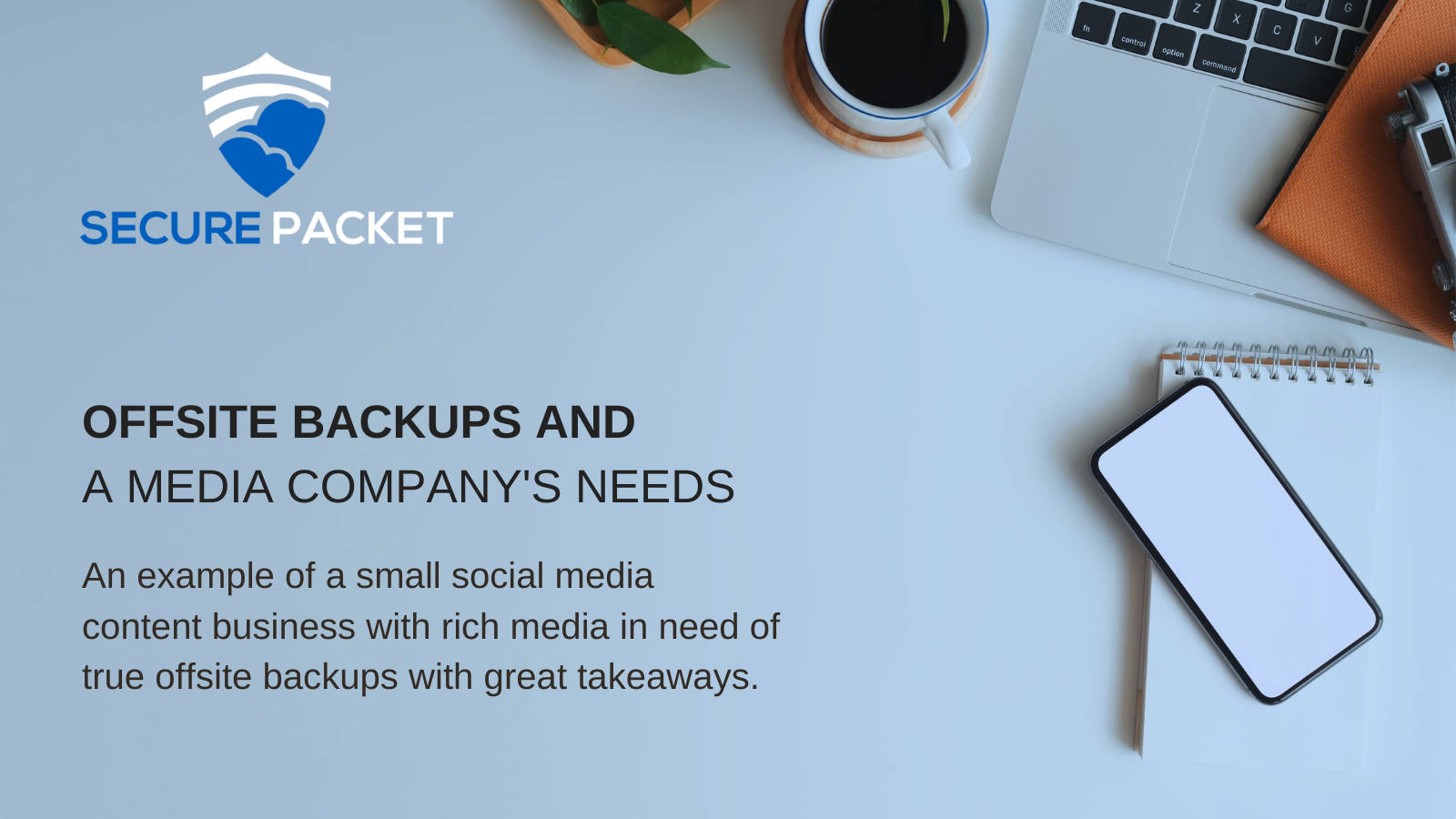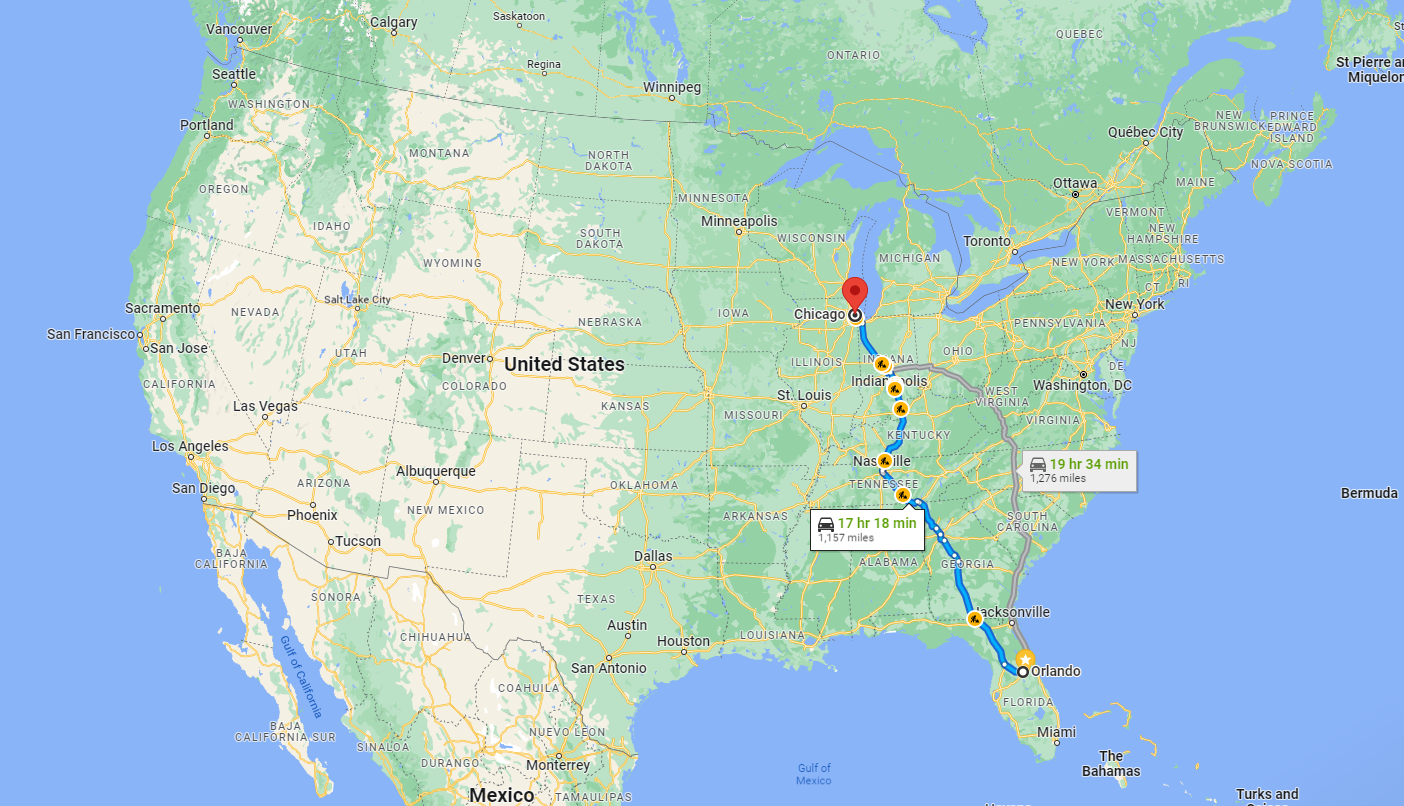
Customer Example of Offsite Backups in Orlando, FL
Offsite backups have become the best practice for any size business now in 2022. There used to be a time when offsite backups were reserved for only mission-critical data, health records, or enterprise-type businesses because of the cost associated with the services. This is no longer the case in 2022 and we will use a Secure Packet customer as an example. The customer provided prior approval to use the situation they were in when they first came to Secure Packet in 2021 with no idea how to create a disaster recovery plan, let alone what to do about offsite backups in Orlando, Florida. If you are wondering why you might even need offsite backups, take a second to read this blog post that goes further in-depth on why you would need offsite backups.
Legacy Types Of Offsite Backups
In the past, your main options were usually a tape-based backup system where you would cycle tapes every day or at least once a week. At the end of the work week, these tapes would be removed from the primary data location and shipped off to a remote storage location. If your data was extremely sensitive or you were under some type of compliance or risk management then you would usually contract with a service like Iron Mountain. This is a service where an armored truck, or something close to that depending on the service you chose, would arrive at your location like a Brinks truck picking up cash from a bank. You would check in the driver at the front of your data center or primary data location and transfer your backup tapes or other media to Iron Mountain’s driver. The driver and usually partner would then complete the rest of their stops and then securely place your backups in the offsite location you chose. There are even further steps like placing these backups in a more secure location or even a bomb-proof type location whether that is underground or in a mountain that has been carved out to provide maximum protection for the backups.
This service was a great solution for those businesses that want to ensure that in case of a disaster such as riots, hurricanes, tornados, earthquakes, etc. their data would be safe and available to them when needed. This type of service would accomplish this by removing the backups from your region and placing them in a different geographic location.
This type of service is still in use today and as of 2021, Iron Mountain’s revenue is $4.492 billion US dollars. Iron Mountain does not just do backup delivery anymore, but you can see there is still high demand for secure storage and logistics services.
Offsite Backups in 2022
Now in 2022, Offsite backups for the majority of small and medium backups are transferred across the internet while being encrypted or if your business has a high enough level of data change per minute, hour, or daily then you would have to purchase dedicated bandwidth between your primary site and offsite locations. Your decision on RPO and RTO would dictate whether or not you would require these dedicated connections between sites or not. If you are unsure about restore point objectives and restore point objections, click here to read more.
For this example, we will assume that the business is 25 employees that are currently operating in a hybrid scenario with some employees in the office and some out of their homes. They are a social media company that posts on social media, creates content, and has a lot of rich media files for their customers. They store them locally in their primary office in Orlando which has a battery and generator for power backup and a fiber internet connection. Remote employees VPN into their office environment to retrieve and store any customer files they have been working on or creating. What they do not have is any “mission critical” type data that they can’t be without for a few hours. Examples of data sources that would be devastating to not have access to for 6 hours would be patient medical records, child protective service records, banking information, etc. The business decision-makers at this company we will refer to as Company X did a risk assessment with Secure Packet to determine that with their current goals, budget, and IT resources that daily backups with 30-day retention plus a separate policy of 12 monthly backups were the perfect fit for them. This would enable them to go back up to a full year if they were hit with a crypto locker type malware or if they needed a file for a customer that was deleted on accident but not noticed for a longer amount of time.
Determining Best Fit For The Business
With the restore point objective (RPO) determined to be daily, the next was the restore time objective (RTO). Again, during the risk assessment, it was determined that if they could retrieve the latest files that their team was working on first within about 6 hours and then the archives as bandwidth allowed then it would work with their business model without causing too many headaches for their team or their clients. The number one worry was the loss of data and not how fast it was to restore.
With the basics out of the way and the hardware and software selections completed by Secure Packet, the offsite location from Orlando needed to be selected and secured. Seeing that their IT team consisted of one IT person, it wasn’t feasible to add a remote colocation site with a minimum of a firewall, IPS, SIEM, a storage server, and have just one IT person oversees all of the maintenance.

Finding The Perfect Fit With Offsite Backups
Secure Packet was then tasked with finding the perfect solution for their needs that also aligned with the risk assessment and overall IT budget. Secure Packet ended up selecting Veeam Cloud Connect provider out of Chicago, Illinois to ensure that if there is an east coast or the Gulf of Mexico hurricane then company X would not have to worry about it. Chicago also does not have to worry about earthquakes or tornados as much as other locations.
There was a question of how much data changes at a daily rate for the client and since there were no appropriate monitoring tools in place to monitor the data change, it wasn’t possible to be 100% sure about their bandwidth out of the main office or whether an option like a WAN accelerator was needed until the system was put in place and tried out. The other option if the upload speed on the primary internet connection out of the location wasn’t enough was going to be to upgrade the internet connection. It turns out that the upload speed was more than enough after the initial seed as expected. The initial seed also included the archives of older customer data so it was expected to take much longer than the normal nightly and monthly backups. The first backup took over 5 days to complete and now the daily backups from Orlando to Chicago will take from 4 hours to 10 hours max. We were able to also determine from the backup reports that anytime video content was created, this is where the larger and longer backups were taking place.
Next Stage of Disaster Recovery and Offsite Backups
As company X grows, there was concern about the costs associated with Cloud Connect since they are a rich media company and they have a policy of never deleting any of their customer’s old data even if the customer is no longer with company X. This is understandable and something that we run into often with our clients as data in business is very valuable. Secure Packet came up with a future plan that will be enacted when they cross a certain revenue range or storage capacity range. This plan will change as hard drives become less expensive per terabyte and as other technologies improve.
There were also questions about using AWS or Azure for backups. There is nothing wrong with using these or other cloud providers for backups especially if your backup software, like Veeam, was created to work with those cloud providers’ storage options. The issue with these types of storage was the costs associated with storage and retrieval of the data. Their lone IT person did an initial investigation about AWS storage and wanted to move forward with AWS since they have a solid brand name and the IT person thought it would be cool to use. Since the IT person didn’t have experience in AWS, there fell short of seeing the whole costs associated with AWS and the different types of storage products such as bandwidth out of the platform. The IT budget for company X is quite tight and the last thing the decision makers at company X wanted to do was sign a long-term contract for something that was already a tight fit in the budget. Secure Packet was able to provide a solution that would reduce their overall cost over AWS by 48% while also having no costs to retrieve data which would be thousands and thousands of dollars depending on how much of their data they needed to retrieve.
Visibility Removes Stress
The lone IT person at company X has always worried about their backups as their current solution didn’t provide reports on the completion and validity of their backups. They have had issues restoring prior so the stress level around backups was there, let alone they didn’t have offsite backups so if the primary location was destroyed then there was no coming back from the data loss.
Secure Packet implemented the Veeam Backup and Replication solution for company X and now there is a daily report provided to the lone IT person at company X. The report is automatically delivered at 8:00 am every morning so it can be reviewed for competition both at the Orlando primary location and the Chicago offsite backup location. There is no more worrying about whether or not the backups have been completed or if there are any issues with the validity of the backups and offsite backups.
Looking for some help and guidance on what the next step is for your offsite backups and disaster recovery plan? Secure Packet engineers are standing by to help. Schedule a free call today to ensure you are covered. We provide Backup and DR solutions while also providing consulting-only offerings as well to ensure you have someone reviewing your vendors to ensure they will be able to meet your business’s needs.
